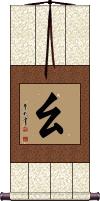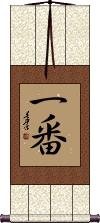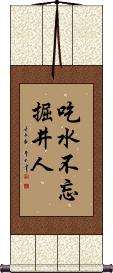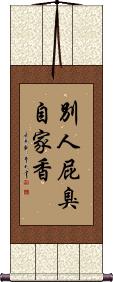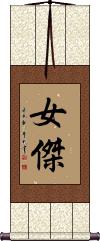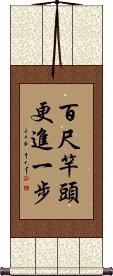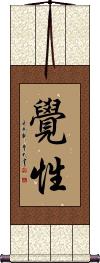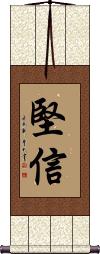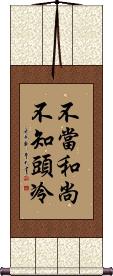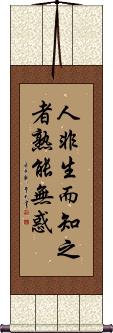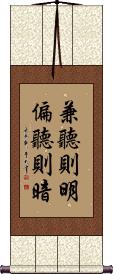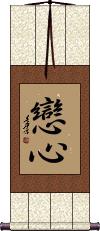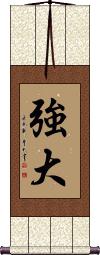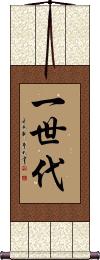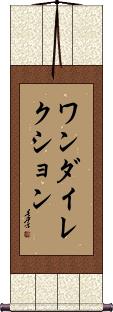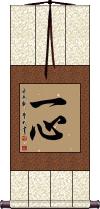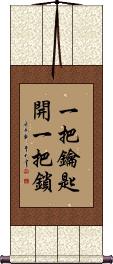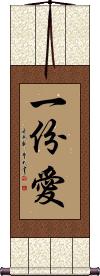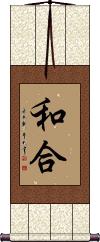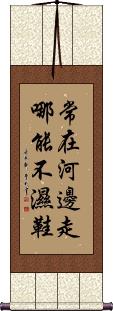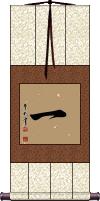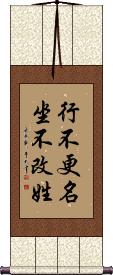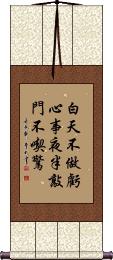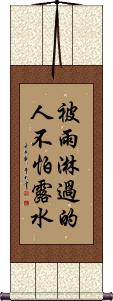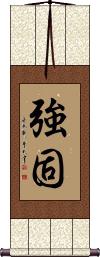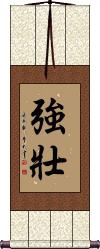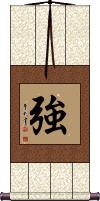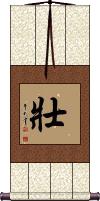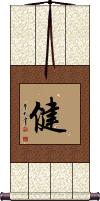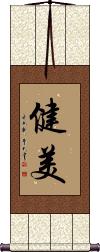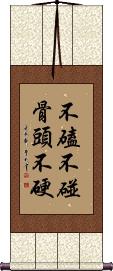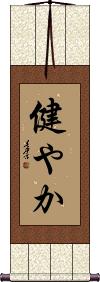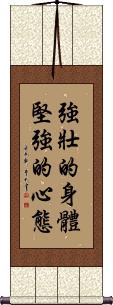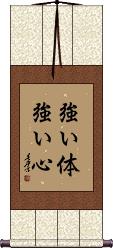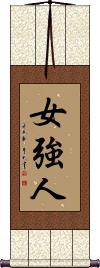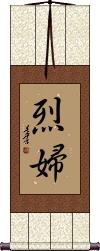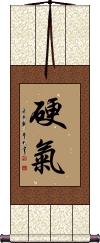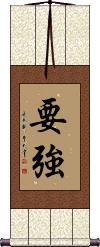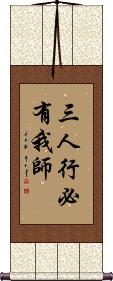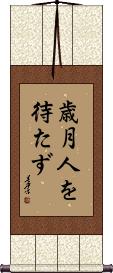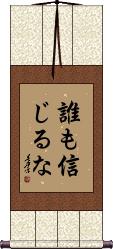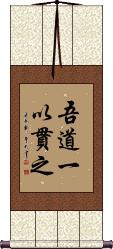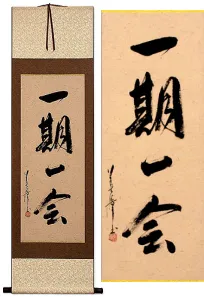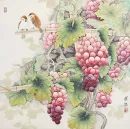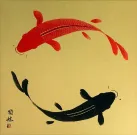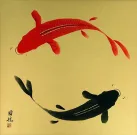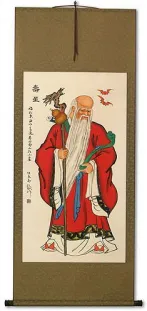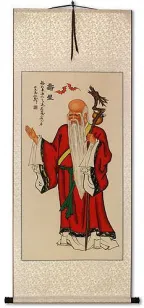Many custom options...
And formats...

The Strong One in Chinese / Japanese...
Buy a The Strong One calligraphy wall scroll here!
Personalize your custom “The Strong One” project by clicking the button next to your favorite “The Strong One” title below...
Switched to secondary search mode due to lack of results using primary.
These secondary results may not be very accurate. Try a different but similar meaning word or phrase for better results. Or...
Look up The Strong One in my Japanese Kanji & Chinese Character Dictionary(My dictionary is a different system then the calligraphy search you just tried)
If you want a special phrase, word, title, name, or proverb, feel free to contact me, and I will translate your custom calligraphy idea for you.
1. One Day Seems Like 1000 Years
2. Ace / One
4. Seeing one’s Nature and becoming a Buddha
5. Working Together as One / Cooperation
6. Stay Strong / Indestructible / Unbreakable
7. Drinking the water of a well: One should never forget who dug it
8. The farts of others stink, but one’s own smells sweet
9. Fierce and courageous training defeats the strong and protects the body.
10. The one who retreats 50 paces mocks the one to retreats 100
12. Words Have Enormous Weight: One Word Worth Nine Caldrons
13. Woman of Strong Character / Woman Hero
14. Even The 100-Foot Bamboo Can Grow One More Foot
15. One Justice Can Overpower 100 Evils
16. The Nature of Enlightenment in One's Mind
17. Firm Belief / Strong Faith
18. To Know Hardship, One Must Experience It
19. We are not born with knowledge, how does one achieve maturity?
20. Listen to Both Sides and be Enlightened, Listen to One Side and be in the Dark
21. Live Strong
23. Mighty / Powerful / Strong
24. No one knows a son better than the father
25. One Direction
27. One Heart / One Mind / Heart and Soul
29. One Love
30. One Mind / Unity
31. One who walks by the river may end up with wet feet
32. One
34. One Who Does Not Do Bad Things, Worries Not of Knocks at His Door
35. One who is drenched in rain does not fear drops of dew
36. Strength: Strong and Solid
39. Strong / Robust
40. Strong / Healthy
42. Strong bones come from hard knocks
43. Strong / Healthy
44. Strong-Willed / Strong of Heart
45. Strong Hearted / Strong Willed
48. The Strong One
49. Strong Woman
51. Strong Willed
52. Strong Minded
53. Tempering Makes Strong Steel
54. The Chosen One
55. A Journey of 1000 Miles Feels Like One
56. When Three People Gather, One Becomes a Teacher
58. Trust No One / Trust No Man
59. There is one single thread binding my Way together
60. The Weak are Meat, The Strong Eat
62. Work Together with One Mind
One Day Seems Like 1000 Years
一日千秋 is a Japanese and Chinese proverb about missing someone.
一日千秋 is often used to express how hard it is to wait for someone's return or to be away from someone.
Some will translate this as “one day feels like a very long time” or “waiting for someone (something) is hard.”
You might see this romanized as a single word, Ichijitsusenshuu, or as “Ichijitsu Senshuu” from Japanese.
If you break down the characters one-by-one, we get:
一 = one/a
日 = day/sun (can also represent time or date)
千 = 1000/thousand
秋 = autumn/fall
Together, 千秋 can mean “autumn comes thousand times” (or 1000 years). It can also be read as 1000 periods of time.
However, it relays the idea of heartache as you wait for someone you miss.
Ace / One
幺 means one, as used on a dice or in a card game.
Thus, in that context, it means Ace.
幺 can also be the surname “Yao” in both Chinese and Japanese.
Note: Rarely if ever used in Korean.
幺 can sometimes be written these ways: ![]()
![]()
Best / Number One
Seeing one’s Nature and becoming a Buddha
見性成佛 is a universal phrase that suggests that one may see one's nature and accomplish Buddhahood.
見性 suggests penetrating deep inside oneself to see one's “Original finally
Mind.”
成佛 refers to a sentient being who dispenses with illusions and delusions
through ascetic practice, is enlightened to the truth, and becomes a Buddha.
This is used by Mahayana, Chan, and Zen Buddhists in China, Korea, and Japan.
You will also see this with the last character written as 仏 in Japanese. In the religious context, 佛 is commonly used to mean Buddha. If you want the other version, see Kenshō Jōbutsu 見性成仏
Working Together as One / Cooperation
Stay Strong / Indestructible / Unbreakable
金剛不壞 is originally a Buddhist term for “The diamond indestructible.”
Sometimes, it's written 金剛不壞身, The diamond-indestructible body.
Outside that context, it still means firm and solid, sturdy and indestructible, unshakable, or adamantine (a mythological indestructible material).
![]() Note: If you order this from the Japanese master calligrapher, the last Kanji will look like the one shown to the right.
Note: If you order this from the Japanese master calligrapher, the last Kanji will look like the one shown to the right.
Drinking the water of a well: One should never forget who dug it
This proverb suggests that one should always be grateful to those who helped one succeed.
And remember your ancestors and those that came before you whose sacrifices made your present life better.
Some Chinese will separate the intended meaning from this proverb and translate this as “Don't forget the people who once helped you.” In Modern China, this idiom is virtually never used to refer to an actual well.
Note: This can be pronounced in Korean but it's not a commonly used phrase.
The farts of others stink, but one’s own smells sweet
Fierce and courageous training defeats the strong and protects the body.
The one who retreats 50 paces mocks the one to retreats 100
The pot calls the kettle black
五十步笑百步 is a Chinese proverb that means the one who retreats 50 paces mocks the one who retreats 100 paces.
During the Warring States Period of what is now China (475 - 221 B.C.), the King of Wei was in love with war. He often fought with other kingdoms just for spite or fun.
One day, the King of Wei asked the philosopher Mencius, “I love my people, and all say I do the best for them. I move the people from famine-stricken areas to places of plenty and transport grains from rich areas to the poor. Nobody goes hungry in my kingdom, and I treat my people far better than other kings. But why does the population of my kingdom not increase, and why does the population of other kingdoms not decrease?”
Mencius answered, “Since you love war, I will make this example: When going to war, and the drums beat to start the attack, some soldiers flee for their lives in fear. Some run 100 paces in retreat, and others run 50 steps. Then the ones who retreated 50 paces laugh and taunt those who retreated 100 paces, calling them cowards mortally afraid of death. Do you think this is reasonable?
The King of Wei answered, “Of course not! Those who run 50 paces are just as timid as those who run 100 paces.”
Mencius then said, “You are a king who treats his subjects better than other kings treat their people, but you are so fond of war that your people suffer from great losses in battle. Therefore, your population does not grow. While other kings allow their people to starve to death, you send your people to die in war. Is there any difference?”
This famous conversation led to the six-character proverb shown here. It serves as a warning to avoid hypocrisy. It goes hand-in-hand with the western phrase, “The pot calls the kettle black,” or the Biblical phrase, “Before trying to remove a splinter from your neighbor's eye, first remove the plank from your own eye.”
One Good Deed Each Day
一日一善 is a Chinese, Japanese Kanji, and old Korean Hanja phrase that suggests doing a good deed each day or doing one good turn a day.
It literally reads, “One Day, One Good (Deed).”
Words Have Enormous Weight: One Word Worth Nine Caldrons
一言九鼎 is an ancient Chinese proverb used in modern times to talk of profound or powerful words.
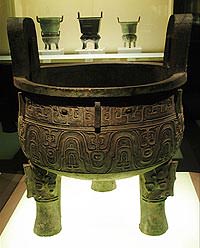 The literal meaning is “one word [worth] nine [sacred] tripods.” The tripod is a highly-prized three-legged (sometimes four-legged) metal pot or kettle of ancient China. They are often made of bronze, and the Emperor would have large ones gilded in gold. See the image to the right for an example.
The literal meaning is “one word [worth] nine [sacred] tripods.” The tripod is a highly-prized three-legged (sometimes four-legged) metal pot or kettle of ancient China. They are often made of bronze, and the Emperor would have large ones gilded in gold. See the image to the right for an example.
Woman of Strong Character / Woman Hero
女傑 can mean brave woman, heroine, lady of character, distinguished woman, outstanding woman, and sometimes prominent woman.
Some people might use this to give a title to women like Amelia Earhart, Rosa Parks, Queen Elizabeth the First, Joan of Arc, Mulan Fa, Yevdokiya Nikolayevna Zavaliy, Harriet Tubman, Anne Frank, Clara Barton, and Jane Eyre.
I use it for a woman like Araceli Segarra (the first woman from Spain to climb Mt. Everest) and gave one of my daughters the middle name of Araceli.
Even The 100-Foot Bamboo Can Grow One More Foot
One Justice Can Overpower 100 Evils
一正压百邪 is an ancient Chinese proverb and idiom that means “One Justice Can Overpower a Hundred Evils.”
While this proverb is famous in China, it has been around so long that its origins have been forgotten.
It could be something that Confucius or one of his disciples said, but no one can say for sure.
The Nature of Enlightenment in One's Mind
Firm Belief / Strong Faith
To Know Hardship, One Must Experience It
不當和尚不知頭冷 is a Chinese proverb that literally translates as: [One who has] not been a monk [does] not know [the feeling of a] cold head.
I need to explain that a Chinese Buddhist monk always has a shaved head, and thus a cold head in winter.
Figuratively, this means: One cannot know the true meaning of hardship until one has experienced it oneself.
This is an idiom in Chinese, so the figurative meaning is what people perceive when they hear or read this phrase. Just as in English, when someone says, "The grass is always greener," one will think about the idea of jealousy, rather than the quality of one’s lawn.
We are not born with knowledge, how does one achieve maturity?
This figuratively means “Without a teacher, how can we learn/mature?”
人非生而知之者熟能無惑 is a philosophic pondering by Han Yu, a Tang Dynasty essayist, and philosopher (618-907 A.D.). This is a Chinese proverb that can be translated as “Knowledge is not innate to man, how can we overcome doubt?” or, “We are not born with knowledge, how does one achieve maturity?.”
This infers that we need the guidance of a teacher if we wish to learn, mature, and become better.
Listen to Both Sides and be Enlightened, Listen to One Side and be in the Dark
兼聽則明偏聽則暗 is an ancient Chinese proverb about getting all the information from all sides so that you truly understand a situation.
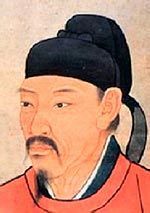
Wei Zheng
A man named Wei Zheng lived between 580-643 AD. He was a noble and wise historian and minister in the court of the early Tang Dynasty. The emperor once asked him, “What should an emperor do to understand the real-world situation, and what makes an emperor out-of-touch with reality?”
Wei Zheng replied, “Listen to both sides and you will be enlightened; listen to only one side and you will be left in the dark.”
Then Wei Zheng went on to cite examples of leaders in history that were victorious after heeding both sides of the story, and other leaders that met their doom because they believed one-sided stories which often came from flattering lips.
Please note that there is an unwritten rule when the same character appears twice in the same phrase, the calligrapher will alter the appearance so that no two characters are exactly alike in the same piece. This calligraphy has two repeating characters that will be written differently than they appear here.
Live Strong
While hard to translate directly, 堅強生活 is the best way to write “Live Strong” in Chinese. If you are a cancer survivor or support Lance Armstrong's ideas, this is a nice selection for a wall scroll.
The first two characters mean strong or staunch. The last two mean living or life (daily existence). While the Chinese version is the reverse order of “Live Strong” it is the only way to write it in a natural form that is grammatically correct.
Note that we are in no way affiliated or connected to Lance or his foundation. This translation is offered because of multiple requests from customers whose philosophies or ideas match those of the Live Strong idea.
Live Strong
強く生きる is “Live Strong” in Japanese.
If you are a cancer survivor, or simply support Lance Armstrong's ideas, this is a nice selection for a wall scroll.
Note that we are in no way affiliated or connected to Lance, nor his foundation.
Note: Because this selection contains some special Japanese Hiragana characters, it should be written by a Japanese calligrapher.
Loving Heart / One’s Love
戀心 literally means “loving heart.” It can also be translated as “one's love” or “awakening of love.”
戀心 is used exclusively for love between boyfriends and girlfriends or husband and wife.
Breaking down the meaning of each Kanji, the first means love, affection, or tender passion. The second Kanji means heart, mind, or soul (most will read it as the heart).
See Also: Compassion | Love
Mighty / Powerful / Strong
強大 can mean mighty, powerful, large, formidable, or strong.
This term is often used to describe soldiers/troops/warriors and whole armies.
No one knows a son better than the father
知子莫若父 can be translated as “No one knows a son better than his father.”
This idiom is based on the idea that after spending many years together, family members know everything about each other. Better than anyone else, a father knows the qualities and shortcomings of his son.
If you are looking for something about “father and son,” this is probably the best selection.
While this is the original proverb (very old), others have been composed about various combinations of mothers, sons, daughters, and fathers. Let me know if you need a custom version.
One Direction
一世代 is a way to write “One Direction” in Chinese, referring to the British-Irish boy band.
They are commonly referred to as “1D” in Japan and China (no Chinese characters for that).
This title does not exactly mean “one direction.” It's closer to “one generation,” “one era,” or “one world.”
One Direction
ワンダイレクション is a way to write “One Direction” in Japanese Katakana, referring to the British-Irish boy band.
They are commonly referred to as “1D” in Japan and China (no Japanese Kanji for that).
This title sounds like “One Direction” using Japanese sounds. Unlike Japanese Kanji words, this does not have any meaning, just pronunciation.
Note: Because this title is entirely Japanese Katakana, it should be written by a Japanese calligrapher.
One Family Under Heaven
天下一家 is a proverb that can also be translated as “The whole world is one family.”
It is used to mean that all humans are related by decree of Heaven.
The first two characters can be translated as “the world,” “the whole country,” “descended from heaven,” “earth under heaven,” “the public,” or “the ruling power.”
The second two characters can mean “one family,” “a household,” “one's folks,” “a house” or “a home.” Usually, this is read as “a family.”
Note: This proverb can be understood in Japanese, though not commonly used.
One Heart / One Mind / Heart and Soul
一心 literally reads as “one heart” in Chinese, Japanese Kanji, and old Korean Hanja.
Colloquially or figuratively, it means: wholeheartedly; heart and soul; of one mind; wholeheartedness; one's whole heart; with the whole mind or heart; one mind in heart.
I'm not kidding, all of those came right from the dictionary for this one title.
In Buddhism, this can refer to the bhūtatathatā, or the whole of things; the universe as one mind, or a spiritual unity.
In Japanese, this can be the female given name, Hitomi.
One Key Opens One Lock
One Love
One Love
One Mind / Unity
和合 means to blend, unite, or be of one mind.
和合 is usually used as a Buddhist term. It can also be defined as harmony, concord, agreement, unity, union, and harmonize/harmonization.
One who walks by the river may end up with wet feet
常在河邊走哪能不濕鞋 is an old Chinese proverb that is sometimes compared to the English saying “Shit Happens.”
It's a reflection that there are risks in life, and you should not be surprised when things don't go your way.
A secondary translation might be, “When walking by a river, often one cannot avoid wet shoes.”
One
The number one
一 is “one” or “1” in Chinese, Japanese Kanji, and old Korean Hanja.
People keep searching for “one” but I'm not sure what you want. This would be a strange selection for a wall scroll, so please don't order it. Post a request on our forum if you want a phrase with “one” in it that you can't find on our site.
The “one” character is really simple, it's just one stroke. Two is two strokes and three is three strokes, from four and above, the characters get more complicated.
In some ways, the “one” character is too simple, it could be a stray mark, or added to a banking document. Therefore, the following banking anti-fraud character for “one” has developed over the last 1500 years in China and Japan:
![]()
![]()
![]()
Proud Of One’s Name
One Who Does Not Do Bad Things, Worries Not of Knocks at His Door
白天不做亏心事夜半敲门不吃惊 literally translates as: [If one does] not do bad things in the daytime, one need not be alarmed at knocks on the door in the middle of the night.
The meaning is something like, “A quiet conscience sleeps in thunder.” Basically, the message is, “don't commit crimes and you won't be jumpy every time the doorbell rings (so don't do anything wrong and your life will have fewer worries and you can sleep at night).”
One who is drenched in rain does not fear drops of dew
Strength: Strong and Solid
強固 means firmness, stability, security, and strength in Japanese.
It's not used commonly in China, but it means “powerful,” “firm,” “solid,” “strong,” or “better than others” in Chinese. There is a slight variation in the top of the first character between Chinese and Japanese. Because this is more of a Japanese word, we are showing the Japanese form here.
強固 is also a Korean word, but Korean Hanja uses the Chinese form of the first character (one tiny stroke is a little different), so just let me know if your audience is Korean when you place your order, and we'll have it written in the Chinese/Korean version.
Strong / Powerful
強壯 is an adjective that means powerful or strong.
It can also be translated as able-bodied, robust, or sturdy.
This version of strength also suggests muscularity.
![]() Note that the second character was simplified in Japan after WWII (also simplified in mainland China but not for calligraphy). If you want the modern Japanese/simplified version, please click on the Kanji shown to the right.
Note that the second character was simplified in Japan after WWII (also simplified in mainland China but not for calligraphy). If you want the modern Japanese/simplified version, please click on the Kanji shown to the right.
Strong / Powerful / Force
強 is a character that means strong, strength, force, powerful, better, stubborn, and stiff (yes, all of this in one character).
This “strong” has less to do with physical strength and more to do with having a winning attitude, or just having the ability to win at something.
Note that most of the time, this character is pronounced “qiang” but when used with the meaning of stubborn, unyielding, or stiff, it is pronounced “jiang” in Chinese.
Also, sometimes “qiang” is used in modern Chinese to describe people that do crazy things (For example: Bicycling from Beijing to Tibet alone). I sometimes can be found outside my Beijing apartment wearing nothing but shorts and a tee-shirt while eating ice cream during a snow storm, just to hear my neighbors call me “qiang.” Maybe they mean “strong” but perhaps they are using the new meaning of “crazy strong.”
強 can also be a Chinese surname that romanizes as Jiang in the mainland or Chiang if from Taiwan.
強 is a valid Korean Hanja character with the same meaning but is mostly used in compound Korean words.
強 is used in Japanese (though normally in compound words). In Japanese, it has the same meaning but in some contexts can mean “a little more than...” or “a little over [some amount].” Most Japanese would read this as tough, strength, stiff, hard, inflexible, obstinate, or stubborn.
The variant 彊 is sometimes seen in older literature.
Strong / Robust
This “strong” character means “to strengthen” or robust. This brings images of a muscle-bound hulk of a weight lifter or bodybuilder to an Asian person who sees this character.
Note that in Korean and Japanese, this character is normally part of compound words, and is not seen alone too often.
![]() Note that the this character was simplified in Japan after WWII (also simplified in mainland China but not for calligraphy). If you want the modern Japanese/simplified version, please click on the Kanji shown to the right.
Note that the this character was simplified in Japan after WWII (also simplified in mainland China but not for calligraphy). If you want the modern Japanese/simplified version, please click on the Kanji shown to the right.
Strong / Healthy
This “strong” character is the more “healthy” version of strong. 健 is the “strong” that is appropriate for an athlete.
Beyond “healthy,” it can also mean strength, persistence, vigorous, or invigorated/invigoration.
Strong and Beautiful
We don't really have a word like 健美 in English, but these two characters create a word that means “strong and beautiful.” It could also be translated as “healthy and beautiful.”
Note: 健美 is a word in Chinese and Korean, but it's also the family name Takemi in Japanese. The characters hold the same meaning in Japanese; however, it's like having the English name Stillwell when few people would perceive the meanings of still and well.
Strong bones come from hard knocks
不磕不碰骨頭不硬 is a Chinese proverb that literally translates as: Without being knocked around a bit, [one's] bones won't become hard.
Figuratively, this means: One can't become strong without first being tempered by “hard knocks.”
While true for everyone, this sounds like the “Iron Body” form of Kung Fu, where practitioners' bodies are beaten (and often bone fractured) in order to become stronger.
For the rest of us, this is just about how we can be tempered and build character through the hardships in our lives.
This is not a common title for a wall scroll in China.
Strong / Healthy
健やか is a verbose way to say strong and healthy in Japanese. 健やか is the “strong” that is appropriate for an athlete.
Beyond “healthy,” it can also mean strength, persistence, vigorous, or invigoration.
Japanese also use the first Kanji to mean the same thing. This version adds two hiragana which serve to emphasize or amplify the word and clarify the meaning.
Note: Because this selection contains some special Japanese Hiragana characters, it should be written by a Japanese calligrapher.
Strong-Willed / Strong of Heart
気の強い means strong-willed or strong of heart in Japanese.
Here's the character breakdown of this Japanese title:
気 (ki) spirit; mind; heart; nature; motivation; intention; feelings; essence.
の (no) possessive particle.
強い (tsuyoi) strong; powerful; mighty; potent; resistant; resilient; durable.
Note: Because this selection contains some special Japanese Hiragana characters, it should be written by a Japanese calligrapher.
Strong Hearted / Strong Willed
意志堅強 can mean either “strong-hearted,” “strong-willed” or “determination.”
The first two characters can be translated as “will,” “willpower,” “determination,” “volition,” “intention,” or “intent.” But, it should be noted that this first part possesses the element of “heart” in the lower portion of both characters (they also partially carry the meaning “with the whole heart”).
The last two characters mean “strong” or “staunch.”
Chinese word order and grammar are a bit different than English, so in this case, they are in reverse order of English but have the correct meaning in a natural form.
See Also: Strong Willed | Discipline | Will-Power
Strong Mind Strong Body
Strong Body, Strong Mind
強い体強い心 is a way to write “strong mind, strong body” in Japanese.
Each of the two lines starts with 強い (tsuyoi) which means: strong; powerful; mighty; potent; resistant; resilient; durable; tough; stiff; hard; inflexible.
The body is represented with 体 (the ancient version is 體, romanized as karada), which means: body; build; physique; posture; torso; trunk; health.
Mind is represented with 心 (kokoro), which can mean heart, mind, or soul, depending on context.
強い體強い心 is not a common phrase in Japanese, so it's not the most natural title for calligraphy. In English, you might want to write it, “strong mind, strong body” but, “strong mind, strong body,” is more natural in Japanese.
Note: Because this selection contains some special Japanese Hiragana characters, it should be written by a Japanese calligrapher.
The Strong One
Strong Woman
女強人 is the best way to say “strong woman” or “strong and independent woman” in Chinese.
Grammar in China is a bit different, so these three characters literally read as “female strength person” or “woman strong person.” This might sound funny in English, but this is a natural-sounding title in Chinese.
Strong-Minded Woman
烈婦 is a Japanese title for a strong-minded woman, virtuous woman, or heroin.
In some contexts, it can refer to a pure or chaste woman.
Strong Willed
Strong Minded
Tempering Makes Strong Steel
Hardship Develops Strong Character
The Chosen One
選ばれし者 is a Japanese title that means “The chosen one” but can also refer to “The select few” or “the chosen ones.”
The last character clarifies that the “one” refers to a person or persons (male or female).
This can also be written 撰ばれし者 or 択ばれし者 with the same pronunciation and meaning. The one shown above is the most common way to write it.
Note: Because this selection contains some special Japanese Hiragana characters, it should be written by a Japanese calligrapher.
A Journey of 1000 Miles Feels Like One
千里も一里 is a Japanese proverb that states “A journey of a thousand miles feels like only one mile.” It is understood that in the proverb, this applies when going to see the one you love.
Note that the “mile” or 里 used in this proverb is an old Chinese “li” (pronounced “ri” in Japanese). It's not actually a mile, as the measurement is really closer to 500 meters (it would take 3 of these to get close to a western mile). Still, 1000里 (333 miles) is a long way.
When Three People Gather, One Becomes a Teacher
三人行必有我师 means “when three people meet, one becomes the teacher.”
This famous Chinese philosophy suggests that when people come together, they can always learn from each other.
One person must be the teacher and others learn. And in turn, the others become the teachers of the knowledge they possess.
It is important to remember that we all have something to teach, and we all have something to learn as well.
Time Waits For No One
歳月人を待たず is a Japanese idiom “Saigetsu hito o matazu” which means “Time waits for no one.”
Another way to put it is, “Time and tide stay for no man.”
Note: Because this selection contains some special Japanese Hiragana characters, it should be written by a Japanese calligrapher.
Trust No One / Trust No Man
無法信任 is the kind of thing you expect to hear in a spy movie.
“Trust no one, 007!”
The first two characters express the idea of “no way” or “cannot.”
The last two characters mean “trust.”
The characters must go in this order due to Chinese grammar issues and in order to sound natural.
Note: This is not an ancient Chinese phrase by any means. It's just that we received a lot of requests for this phrase.
This is as close as you can get to the phrase “trust no man,” though technically, no gender is specified.
Trust No One / Trust No Man
誰も信じるな is as close as you can get to the phrase “trust no man” in Japanese, though no gender is specified.
The first two characters mean everyone or anyone but change to “no one” with the addition of a negative verb.
The third through fifth characters express the idea of believing in, placing trust in, confiding in, or having faith in.
The last character makes the sentence negative (without the last character, this would mean “trust everyone,” with that last character, it's “trust no one”).
Note: Because this selection contains some special Japanese Hiragana characters, it should be written by a Japanese calligrapher.
There is one single thread binding my Way together
吾道一以貫之 is a phrase from the Analects of Confucius that translates as “My Way has one thread that runs through it.”
Other translations include:
My Way is penetrated by a single thread.
There is one single thread binding my Way together.
My Way is run through with a unifying thread.
My Way is Consistent.
And sometimes poetic license is taken, and it is translated as:
My Way is the only one; I'll treasure it and stick to it with humility until the end.
After this was said, some 2500+ years ago, another disciple of Confucius clarified the meaning by stating, “Our master's Way is to be loyal and have a sense of reciprocity.”
In Japanese, this is purported to be romanized as “Waga michi ichi wo motte kore wo tsuranuku,” though some will argue the true pronunciation.
Note: Sometimes written 吾道以一貫之 instead of 吾道一以貫之 with no difference in meaning.
The Weak are Meat, The Strong Eat
Meaning: Survival of the fittest
弱肉強食 is a Japanese and Chinese proverb that literally means “The weak are meat; the strong eat” or “The weak are prey to the strong.”
The closest English version is, “Survival of the fittest.” It also fits with the ideas of, “predatory behavior,” or “The law of the jungle.”
Stay Strong / Iron Will
鉄心石腸 is a Japanese proverb that suggests you should have the inner-strength and will as hard and steadfast as iron.
It's the Japanese way of saying, “stay strong.” This is an especially uplifting thing to say to a person in distress or recovering from a disaster. It's kind of the survivor's creed.
If you literally translate this, it means “iron will, stone guts” or “iron heart, rock-hard bowels.”
Work Together with One Mind
Work Together with One Heart
Solidarity / Working Together as One
This in-stock artwork might be what you are looking for, and ships right away...
Gallery Price: $72.00
Your Price: $39.88
Gallery Price: $61.00
Your Price: $33.88
Gallery Price: $61.00
Your Price: $33.88
Gallery Price: $61.00
Your Price: $33.88
Gallery Price: $61.00
Your Price: $33.88
Gallery Price: $340.00
Your Price: $188.77
The following table may be helpful for those studying Chinese or Japanese...
| Title | Characters | Romaji (Romanized Japanese) | Various forms of Romanized Chinese | |
| One Day Seems Like 1000 Years | 一日千秋 | ichi jitsu sen shuu ichijitsusenshuu ichi jitsu sen shu | yí rì qiān qiū yi2 ri4 qian1 qiu1 yi ri qian qiu yiriqianqiu | i jih ch`ien ch`iu ijihchienchiu i jih chien chiu |
| Ace One | 幺 | yao | yāo / yao1 / yao | |
| Best Number One | 一番 | ichi ban / ichiban | ||
| Seeing one’s Nature and becoming a Buddha | 見性成佛 见性成佛 | ken shou jou butsu kenshoujoubutsu ken sho jo butsu | jiàn xìng chéng fó jian4 xing4 cheng2 fo2 jian xing cheng fo jianxingchengfo | chien hsing ch`eng fo chienhsingchengfo chien hsing cheng fo |
| Working Together as One Cooperation | 同心協力 同心协力 | tóng xīn xié lì tong2 xin1 xie2 li4 tong xin xie li tongxinxieli | t`ung hsin hsieh li tunghsinhsiehli tung hsin hsieh li |
|
| Stay Strong Indestructible Unbreakable | 金剛不壞 / 金剛不壊 金刚不坏 | kon gou fu e kongoufue kon go fu e | jīn gāng bù huài jin1 gang1 bu4 huai4 jin gang bu huai jingangbuhuai | chin kang pu huai chinkangpuhuai |
| Drinking the water of a well: One should never forget who dug it | 吃水不忘掘井人 | chī shuǐ bú wàng jué jǐng rén chi1 shui3 bu2 wang4 jue2 jing3 ren2 chi shui bu wang jue jing ren chishuibuwangjuejingren | ch`ih shui pu wang chüeh ching jen chih shui pu wang chüeh ching jen |
|
| The farts of others stink, but one’s own smells sweet | 別人屁臭自家香 别人屁臭自家香 | bié rén pì chòu zì jiā xiāng bie2 ren2 pi4 chou4 zi4 jia1 xiang1 bie ren pi chou zi jia xiang bierenpichouzijiaxiang | pieh jen p`i ch`ou tzu chia hsiang pieh jen pi chou tzu chia hsiang |
|
| Fierce and courageous training defeats the strong and protects the body. | 剛勇之猛練勝強而保體 刚勇之猛练胜强而保体 | gāng yǒng zhī měng liàn shèng qiáng ér bǎo tǐ gang1 yong3 zhi1 meng3 lian4 sheng4 qiang2 er2 bao3 ti3 gang yong zhi meng lian sheng qiang er bao ti | kang yung chih meng lien sheng ch`iang erh pao t`i kang yung chih meng lien sheng chiang erh pao ti |
|
| The one who retreats 50 paces mocks the one to retreats 100 | 五十步笑百步 | wù shí bù xiào bǎi bù wu4 shi2 bu4 xiao4 bai3 bu4 wu shi bu xiao bai bu wushibuxiaobaibu | wu shih pu hsiao pai pu wushihpuhsiaopaipu |
|
| One Good Deed Each Day | 一日一善 | ichi nichi ichi zen ichinichiichizen | yī rì yī shàn yi1 ri4 yi1 shan4 yi ri yi shan yiriyishan | i jih i shan ijihishan |
| Words Have Enormous Weight: One Word Worth Nine Caldrons | 一言九鼎 | yī yán jiǔ dǐng yi1 yan2 jiu3 ding3 yi yan jiu ding yiyanjiuding | i yen chiu ting iyenchiuting |
|
| Woman of Strong Character Woman Hero | 女傑 女杰 | joketsu | nǚ jié / nv3 jie2 / nv jie / nvjie | nü chieh / nüchieh |
| Even The 100-Foot Bamboo Can Grow One More Foot | 百尺竿頭更進一步 百尺竿头更进一步 | bǎi chǐ gān tóu gèng jìng yī bù bai3 chi3 gan1 tou2 geng4 jing4 yi1 bu4 bai chi gan tou geng jing yi bu baichigantougengjingyibu | pai ch`ih kan t`ou keng ching i pu pai chih kan tou keng ching i pu |
|
| One Justice Can Overpower 100 Evils | 一正壓百邪 一正压百邪 | yī zhèng yā bǎi xié yi1 zheng4 ya1 bai3 xie2 yi zheng ya bai xie yizhengyabaixie | i cheng ya pai hsieh ichengyapaihsieh |
|
| The Nature of Enlightenment in One's Mind | 覺性 觉性 | kakushou / kakusho | jué xìng / jue2 xing4 / jue xing / juexing | chüeh hsing / chüehhsing |
| Firm Belief Strong Faith | 堅信 坚信 | ken shin / kenshin | jiān xìn / jian1 xin4 / jian xin / jianxin | chien hsin / chienhsin |
| To Know Hardship, One Must Experience It | 不當和尚不知頭冷 不当和尚不知头冷 | bù dāng hé shàng bù zhī tóu lěng bu4 dang1 he2 shang4 bu4 zhi1 tou2 leng3 bu dang he shang bu zhi tou leng | pu tang ho shang pu chih t`ou leng pu tang ho shang pu chih tou leng |
|
| We are not born with knowledge, how does one achieve maturity? | 人非生而知之者熟能無惑 | rén fēi shēng ér zhī zhī zhě shú néng wú huò ren2 fei1 sheng1 er2 zhi1 zhi1 zhe3 shu2 neng2 wu2 huo4 ren fei sheng er zhi zhi zhe shu neng wu huo | jen fei sheng erh chih chih che shu neng wu huo | |
| Listen to Both Sides and be Enlightened, Listen to One Side and be in the Dark | 兼聽則明偏聽則暗 兼听则明偏听则暗 | jiān tīng zé míng, piān tīng zé àn jian1 ting1 ze2 ming2, pian1 ting1 ze2 an4 jian ting ze ming, pian ting ze an | chien t`ing tse ming, p`ien t`ing tse an chien ting tse ming, pien ting tse an |
|
| Live Strong | 堅強生活 坚强生活 | jiān qiáng shēng huó jian1 qiang2 sheng1 huo2 jian qiang sheng huo jianqiangshenghuo | chien ch`iang sheng huo chienchiangshenghuo chien chiang sheng huo |
|
| Live Strong | 強く生きる | tsuyoku ikiru tsuyokuikiru | ||
| Loving Heart One’s Love | 戀心 恋心 | koi gokoro / koigokoro | ||
| Mighty Powerful Strong | 強大 强大 | kyoudai / kyodai | qiáng dà / qiang2 da4 / qiang da / qiangda | ch`iang ta / chiangta / chiang ta |
| No one knows a son better than the father | 知子莫若父 | zhī zǐ mò ruò fù zhi1 zi3 mo4 ruo4 fu4 zhi zi mo ruo fu zhizimoruofu | chih tzu mo jo fu chihtzumojofu |
|
| One Direction | 一世代 | yí shì dài yi1 shi4 dai4 yi shi dai yishidai | i shih tai ishihtai |
|
| One Direction | ワンダイレクション | wan dairekushon wandairekushon | ||
| One Family Under Heaven | 天下一家 | tenka ikka / tenkaikka / tenka ika | tiān xià yī jiā tian1 xia4 yi1 jia1 tian xia yi jia tianxiayijia | t`ien hsia i chia tienhsiaichia tien hsia i chia |
| One Heart One Mind Heart and Soul | 一心 | isshin / ishin | yī shì dài yi1 shi4 dai4 yi shi dai yishidai | i shih tai ishihtai |
| One Key Opens One Lock | 一把鑰匙開一把鎖 一把钥匙开一把锁 | yī bǎ yào shi kāi yī bǎ suǒ yi1 ba3 yao4 shi5 kai1 yi1 ba3 suo3 yi ba yao shi kai yi ba suo yibayaoshikaiyibasuo | i pa yao shih k`ai i pa so ipayaoshihkaiipaso i pa yao shih kai i pa so |
|
| One Love | 一份愛 一份爱 | yí fèn ài yi2 fen4 ai4 yi fen ai yifenai | i fen ai ifenai |
|
| One Love | 一つの愛 | hito tsu no ai hitotsunoai | ||
| One Mind Unity | 和合 | wagou / wago wago / wago | hé hé / he2 he2 / he he / hehe | ho ho / hoho |
| One who walks by the river may end up with wet feet | 常在河邊走哪能不濕鞋 常在河边走哪能不湿鞋 | cháng zài hé biān zǒu nǎ néng bù shī xié chang2 zai4 he2 bian1 zou3 na3 neng2 bu4 shi1 xie2 chang zai he bian zou na neng bu shi xie | ch`ang tsai ho pien tsou na neng pu shih hsieh chang tsai ho pien tsou na neng pu shih hsieh |
|
| One | 一 | ichi | yī / yi1 / yi | i |
| Proud Of One’s Name | 行不更名坐不改姓 | xíng bù gēng míng zuò bù gǎi xìng xing2 bu4 geng1 ming2 zuo4 bu4 gai3 xing4 xing bu geng ming zuo bu gai xing | hsing pu keng ming tso pu kai hsing | |
| One Who Does Not Do Bad Things, Worries Not of Knocks at His Door | 白天不做虧心事夜半敲門不吃驚 白天不做亏心事夜半敲门不吃惊 | bái tiān bú zuò kuī xīn shì yè bàn qiāo mén bù chī jīng bai2 tian1 bu2 zuo4 kui1 xin1 shi4 ye4 ban4 qiao1 men2 bu4 chi1 jing1 bai tian bu zuo kui xin shi ye ban qiao men bu chi jing | pai t`ien pu tso k`uei hsin shih yeh pan ch`iao men pu ch`ih ching pai tien pu tso kuei hsin shih yeh pan chiao men pu chih ching |
|
| One who is drenched in rain does not fear drops of dew | 被雨淋過的人不怕露水 被雨淋过的人不怕露水 | bèi yǔ lín guò de rén bù pà lù shuǐ bei4 yu3 lin2 guo4 de ren2 bu4 pa4 lu4 shui3 bei yu lin guo de ren bu pa lu shui | pei yü lin kuo te jen pu p`a lu shui pei yü lin kuo te jen pu pa lu shui |
|
| Strength: Strong and Solid | 強固 强固 | kyouko / kyoko | qiáng gù / qiang2 gu4 / qiang gu / qianggu | ch`iang ku / chiangku / chiang ku |
| Strong Powerful | 強壯 强壮 | kyousou / kyoso | qiáng zhuàng qiang2 zhuang4 qiang zhuang qiangzhuang | ch`iang chuang chiangchuang chiang chuang |
| Strong Powerful Force | 強 强 | kyou / kyo | qiáng / qiang2 / qiang | ch`iang / chiang |
| Strong Robust | 壯 壮 | sou / so | zhuàng / zhuang4 / zhuang | chuang |
| Strong Healthy | 健 | ken | jiàn / jian4 / jian | chien |
| Strong and Beautiful | 健美 | takemi | jiàn měi / jian4 mei3 / jian mei / jianmei | chien mei / chienmei |
| Strong bones come from hard knocks | 不磕不碰骨頭不硬 不磕不碰骨头不硬 | bù kē bù pèng gǔ tóu bù yìng bu4 ke1 bu4 peng4 gu3 tou2 bu4 ying4 bu ke bu peng gu tou bu ying bukebupenggutoubuying | pu k`o pu p`eng ku t`ou pu ying pukopupengkutoupuying pu ko pu peng ku tou pu ying |
|
| Strong Healthy | 健やか | sukoyaka | ||
| Strong-Willed Strong of Heart | 氣の強い 気の強い | ki no tsuyo i kinotsuyoi | ||
| Strong Hearted Strong Willed | 意志堅強 意志坚强 | yì zhì jiān qiáng yi4 zhi4 jian1 qiang2 yi zhi jian qiang yizhijianqiang | i chih chien ch`iang ichihchienchiang i chih chien chiang |
|
| Strong Mind Strong Body | 強壯的身體堅強的心態 强壮的身体坚强的心态 | qiáng zhuàng de shēn tǐ jiān qiáng de xīn tài qiang2 zhuang4 de shen1 ti3 jian1 qiang2 de xin1 tai4 qiang zhuang de shen ti jian qiang de xin tai | ch`iang chuang te shen t`i chien ch`iang te hsin t`ai chiang chuang te shen ti chien chiang te hsin tai |
|
| Strong Body, Strong Mind | 強い體強い心 強い体強い心 | tsuyo i karada tsuyo i kokoro tsuyoikaradatsuyoikokoro | ||
| The Strong One | 強いもの | tsuyoi mono tsuyoimono | ||
| Strong Woman | 女強人 女强人 | nǚ qiáng rén nv3 qiang2 ren2 nv qiang ren nvqiangren | nü ch`iang jen nüchiangjen nü chiang jen |
|
| Strong-Minded Woman | 烈婦 | reppu / repu | ||
| Strong Willed | 硬氣 硬气 | yìng qì / ying4 qi4 / ying qi / yingqi | ying ch`i / yingchi / ying chi | |
| Strong Minded | 要強 要强 | yào qiáng yao4 qiang2 yao qiang yaoqiang | yao ch`iang yaochiang yao chiang |
|
| Tempering Makes Strong Steel | 百煉才成鋼 / 百煉纔成鋼 百炼才成钢 | bǎi liàn cái chéng gāng bai3 lian4 cai2 cheng2 gang1 bai lian cai cheng gang bailiancaichenggang | pai lien ts`ai ch`eng kang pailientsaichengkang pai lien tsai cheng kang |
|
| The Chosen One | 選ばれし者 | erabareshimono | ||
| A Journey of 1000 Miles Feels Like One | 千里も一里 | sen ri mo ichi ri senrimoichiri | ||
| When Three People Gather, One Becomes a Teacher | 三人行必有我師 三人行必有我师 | sān rén xíng bì yǒu wǒ shī san1 ren2 xing2 bi4 you3 wo3 shi1 san ren xing bi you wo shi sanrenxingbiyouwoshi | san jen hsing pi yu wo shih sanjenhsingpiyuwoshih |
|
| Time Waits For No One | 歳月人を待たず | sai getsu hito o ma ta zu saigetsuhitoomatazu | ||
| Trust No One Trust No Man | 無法信任 无法信任 | wú fǎ xìn rèn wu2 fa3 xin4 ren4 wu fa xin ren wufaxinren | wu fa hsin jen wufahsinjen |
|
| Trust No One Trust No Man | 誰も信じるな | dare mo shin ji ru na daremoshinjiruna | ||
| There is one single thread binding my Way together | 吾道一以貫之 吾道一以贯之 | ware dou tsurayuki waredoutsurayuki ware do tsurayuki | wú dào yī yǐ guàn zhī wu2 dao4 yi1 yi3 guan4 zhi1 wu dao yi yi guan zhi wudaoyiyiguanzhi | wu tao i i kuan chih wutaoiikuanchih |
| The Weak are Meat, The Strong Eat | 弱肉強食 | jaku niku kyoo shoku jakunikukyooshoku jaku niku kyo shoku | ruò ròu qiáng shí ruo4 rou4 qiang2 shi2 ruo rou qiang shi ruorouqiangshi | jo jou ch`iang shih jojouchiangshih jo jou chiang shih |
| Stay Strong Iron Will | 鉄心石腸 | tesshin sekichou tesshinsekichou teshin sekicho | ||
| Work Together with One Mind | 一味同心 | ichi mi dou shin ichimidoushin ichi mi do shin | ||
| Work Together with One Heart | 齊心協力 齐心协力 | qí xīn xié lì qi2 xin1 xie2 li4 qi xin xie li qixinxieli | ch`i hsin hsieh li chihsinhsiehli chi hsin hsieh li |
|
| Solidarity Working Together as One | 一致団結 | icchidanketsu ichidanketsu | ||
| In some entries above you will see that characters have different versions above and below a line. In these cases, the characters above the line are Traditional Chinese, while the ones below are Simplified Chinese. | ||||
Successful Chinese Character and Japanese Kanji calligraphy searches within the last few hours...

